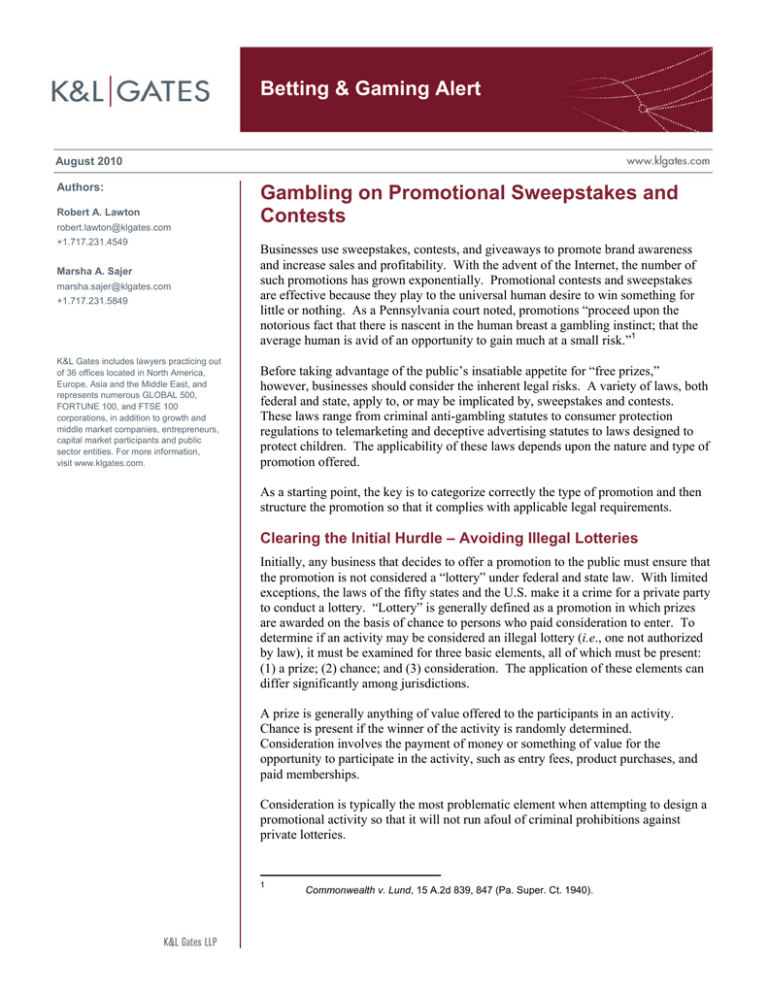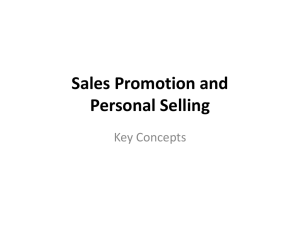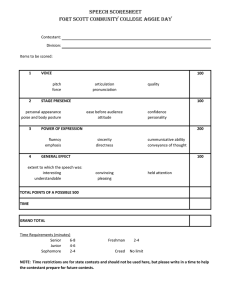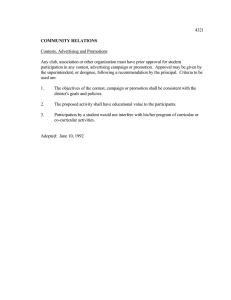
Betting & Gaming Alert
August 2010
Authors:
Robert A. Lawton
robert.lawton@klgates.com
+1.717.231.4549
Marsha A. Sajer
marsha.sajer@klgates.com
+1.717.231.5849
K&L Gates includes lawyers practicing out
of 36 offices located in North America,
Europe, Asia and the Middle East, and
represents numerous GLOBAL 500,
FORTUNE 100, and FTSE 100
corporations, in addition to growth and
middle market companies, entrepreneurs,
capital market participants and public
sector entities. For more information,
visit www.klgates.com.
Gambling on Promotional Sweepstakes and
Contests
Businesses use sweepstakes, contests, and giveaways to promote brand awareness
and increase sales and profitability. With the advent of the Internet, the number of
such promotions has grown exponentially. Promotional contests and sweepstakes
are effective because they play to the universal human desire to win something for
little or nothing. As a Pennsylvania court noted, promotions “proceed upon the
notorious fact that there is nascent in the human breast a gambling instinct; that the
average human is avid of an opportunity to gain much at a small risk.”1
Before taking advantage of the public’s insatiable appetite for “free prizes,”
however, businesses should consider the inherent legal risks. A variety of laws, both
federal and state, apply to, or may be implicated by, sweepstakes and contests.
These laws range from criminal anti-gambling statutes to consumer protection
regulations to telemarketing and deceptive advertising statutes to laws designed to
protect children. The applicability of these laws depends upon the nature and type of
promotion offered.
As a starting point, the key is to categorize correctly the type of promotion and then
structure the promotion so that it complies with applicable legal requirements.
Clearing the Initial Hurdle – Avoiding Illegal Lotteries
Initially, any business that decides to offer a promotion to the public must ensure that
the promotion is not considered a “lottery” under federal and state law. With limited
exceptions, the laws of the fifty states and the U.S. make it a crime for a private party
to conduct a lottery. “Lottery” is generally defined as a promotion in which prizes
are awarded on the basis of chance to persons who paid consideration to enter. To
determine if an activity may be considered an illegal lottery (i.e., one not authorized
by law), it must be examined for three basic elements, all of which must be present:
(1) a prize; (2) chance; and (3) consideration. The application of these elements can
differ significantly among jurisdictions.
A prize is generally anything of value offered to the participants in an activity.
Chance is present if the winner of the activity is randomly determined.
Consideration involves the payment of money or something of value for the
opportunity to participate in the activity, such as entry fees, product purchases, and
paid memberships.
Consideration is typically the most problematic element when attempting to design a
promotional activity so that it will not run afoul of criminal prohibitions against
private lotteries.
1
Commonwealth v. Lund, 15 A.2d 839, 847 (Pa. Super. Ct. 1940).
Betting & Gaming Alert
This is because some jurisdictions deem nonmonetary actions by participants to constitute
consideration under the lottery laws. For example,
some states treat a participant’s expenditure of time
and effort or the disclosure of personal information
as consideration. Thus, requiring a participant to
complete a detailed marketing questionnaire may be
deemed to constitute consideration.
In connection with sweepstakes, many states
mandate that the sponsor disclose particular
information to potential entrants, such as eligibility
requirements and odds of winning. In addition,
some states require sponsors to register and satisfy
bonding requirements for sweepstakes where the
total retail value of the prizes is greater than a
certain dollar limit.
To run a lawful promotional activity, the sponsoring
business must eliminate at least one of the three
elements of a lottery – prize, chance, or
consideration.
Contests
Sweepstakes are no more than lotteries without the
element of consideration. For example, a radio callin promotion for the chance to win free concert
tickets is not a lottery because the caller pays
nothing for the chance to win. Contests are no more
than lotteries where chance is eliminated because the
skill of the contestants is the deciding factor in
determining the winner – for example, a best songwriting contest.
Next Step – Structuring the Promotion
The next step is to decide whether to structure a
promotion as a sweepstakes, a contest, or a
giveaway. Although state laws with respect to each
type of promotion activity differ, the overarching
purpose is to mandate truthful disclosures and avoid
misleading the public.
Sweepstakes
Promotional sweepstakes typically involve a
promotion where participants submit an entry form
and the sponsor then conducts a random drawing
from among the entries to determine the winner. As
noted above, to avoid being a lottery, the element of
consideration must be avoided. If the primary
method of entry is to purchase a product, e.g., a
scratch-off game in conjunction with the purchase of
a meal, the sponsoring business can eliminate the
consideration requirement by including a free way to
enter, such as offering the scratch-off game without
purchasing a meal. This can be done by permitting
individuals who want to participate but do not want
to purchase a product to mail an entry form to the
sponsor, who then sends the individual a scratch-off
game.
Promotional contests typically involve a skill-based
promotion where the prizes are awarded based on an
evaluation of the skill of the contestants. Examples
include best essay or photo contests, stock trading
contests, and intellectual contests. As noted above,
with contests, it is imperative to remove (or
significantly reduce) the element of chance in
determining the winner. Important to
accomplishing this is for the sponsor to establish
easily understood and objective judging criteria and
to ensure that qualified judges use these criteria
when evaluating the entries.
Often, sponsors allow contestants to participate
without paying an entry fee or making a purchase,
but some may choose to require an entry fee or
purchase to enter a contest. Because the element of
chance is already missing from the skill contest,
doing so may not implicate lottery prohibitions.
However, some jurisdictions have enacted laws that
expressly restrict or prohibit a payment requirement
in connection with skill contests. Therefore, any
sponsor that intends to charge an entry fee must be
careful to ensure compliance with the pertinent state
law or laws, in the case of national or multijurisdictional contests.
Giveaways
While pure giveaways do not invoke the private
lottery prohibition, businesses offering such
promotions need to be aware of laws governing the
collection of personal information and statutes
designed to protect children, among others, and
must assess how to protect against possible
allegations of violations of these laws or fraudulent
inducement.
August 2010
2
Betting & Gaming Alert
Final Requirement – Drafting Official
Rules
Once a sponsor decides on a promotion activity –
sweepstakes, contest, or giveaway – it must develop
official rules. Rules for contests and sweepstakes
may look like they would be easy to draft – they are
ubiquitous, appearing in connection with every
imaginable product or service, from cold cereal to
car tune-ups – but are traps for the unwary.
Official rules are effectively a contract between the
sponsor and the participant. The sponsor is
generally bound to operate the promotion in
compliance with the terms and conditions identified
in the official rules and, therefore, the sponsor
should disclose all material terms. Some states have
specific laws and regulations that identify
information that must be disclosed to potential
entrants. The required disclosures, however, differ
based upon the jurisdiction.
Generally, the official rules for sweepstakes should
include, among other disclosures, some variation of
the following: (1) no purchase is necessary; (2) start
and end dates; (3) eligibility requirements; (4) entry
methods; (5) odds of winning; (6) description and
value of prizes; and (7) the sponsor’s name and
address. Similarly, the official rules for a contest
should set forth the material terms of the promotion,
including who is eligible to participate, how to
participate, how winners will be selected
(particularly the judging criteria), and a description
of the prizes available. If the contest requires an
entrant to submit an original work, such as a photo
or essay, the sponsor should also consider whether it
wants any intellectual property rights to the entrant’s
submissions and, if so, should address it in the
official rules.
Official rules function not only to inform the
participants of the rules and conditions of a contest
or sweepstakes, but also to protect the sponsor. To
that end, rules may include provisions limiting the
number of entries from entrants, preserving the
ability to substitute prizes, and disclaiming
warranties in the conduct of the promotion and
provision of the prize.
While official rules for pure giveaways may not be
required, having them may help limit the sponsor’s
exposure to liability or may help avoid bad
publicity. For example, notice that a radio station
will give a free t-shirt only to the first 100 listeners
that attend a live broadcast or to listeners over the
age of 18 “while supplies last” may help protect the
sponsoring radio station from allegations that it
attempted to mislead or dupe the station’s listeners.
Conclusion
Sweepstakes and contests are a time-tested and
effective way for businesses to generate enthusiasm,
promote brand recognition, and increase sales.
These promotions, however, subject the sponsor to a
host of differing state and federal laws and
regulations. It is important to develop and structure
sweepstakes and contests to avoid the universal
prohibition against private gambling schemes and to
ensure compliance with consumer protection and
truth in advertising laws, among others. Review of
a promotion and careful crafting of its rules will
help ensure that the promotion accomplishes its
desired end – heightened, positive awareness of the
product or service – and avoid or minimize the
sponsor’s exposure to liability and adverse
publicity.
Anchorage Austin Beijing Berlin Boston Charlotte Chicago Dallas Dubai Fort Worth Frankfurt Harrisburg Hong Kong London
Los Angeles Miami Moscow Newark New York Orange County Palo Alto Paris Pittsburgh Portland Raleigh Research Triangle Park
San Diego San Francisco Seattle Shanghai Singapore Spokane/Coeur d’Alene Taipei Tokyo Warsaw
Washington, D.C.
K&L Gates includes lawyers practicing out of 36 offices located in North America, Europe, Asia and the Middle East, and represents numerous GLOBAL 500, FORTUNE 100, and FTSE 100 corporations, in
addition to growth and middle market companies, entrepreneurs, capital market participants and public sector entities. For more information, visit www.klgates.com.
K&L Gates is comprised of multiple affiliated entities: a limited liability partnership with the full name K&L Gates LLP qualified in Delaware and maintaining offices throughout the United States, in Berlin and
Frankfurt, Germany, in Beijing (K&L Gates LLP Beijing Representative Office), in Dubai, U.A.E., in Shanghai (K&L Gates LLP Shanghai Representative Office), in Tokyo, and in Singapore; a limited liability
partnership (also named K&L Gates LLP) incorporated in England and maintaining offices in London and Paris; a Taiwan general partnership (K&L Gates) maintaining an office in Taipei; a Hong Kong general
partnership (K&L Gates, Solicitors) maintaining an office in Hong Kong; a Polish limited partnership (K&L Gates Jamka sp. k.) maintaining an office in Warsaw; and a Delaware limited liability company (K&L
Gates Holdings, LLC) maintaining an office in Moscow. K&L Gates maintains appropriate registrations in the jurisdictions in which its offices are located. A list of the partners or members in each entity is
available for inspection at any K&L Gates office.
This publication is for informational purposes and does not contain or convey legal advice. The information herein should not be used or relied upon in regard to any particular facts or circumstances without
first consulting a lawyer.
©2010 K&L Gates LLP. All Rights Reserved.
August 2010
3





